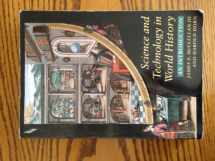
Science and Technology in World History: An Introduction
Book details
Summary
Description
"Science has become so identified with practical benefits that the dependence of technology on science is commonly assumed to be a timeless relationship and a single enterprise... That belief, however, is an artifact of twentieth-century cultural attitudes superimposed without warrant on the historical record." -- from Science and Technology in World History: An Introduction
In modern industrial society, the tie between science and technology seems clear, even inevitable. But historically, as James E. McClellan III and Harold Dorn remind us, the connection has been far less apparent. For much of human history, technology depended more on the innovation of skilled artisans than it did on the speculation of scientists. Technology as "applied science," the authors argue, emerged relatively recently, as industry and governments began funding scientific research that would lead directly to new or improved technologies. In Science and Technology in World History, McClellan and Dorn offer an introduction to this changing relationship.
McClellan and Dorn review the historical record beginning with the thinking and tool making of prehistoric humans. Neolithic people, for example, developed metallurgy of a sort, using naturally occurring raw copper, and kept systematic records of the moon's phases. Neolithic craftsmen possessed practical knowledge of the behavior of clay, fire, and other elements of their environment, but though they may have had explanations for the phenomena of their crafts, they toiled without any systematic science of materials or the self-conscious application of theory to practice.
McClellan and Dorn identify two great scientific traditions: the useful sciences, patronized by the state from the dawn of civilization, and scientific theorizing, initiated by the ancient Greeks. Theirs is a survey of the historical twists and turns of these traditions, leading to the science of our own day.
Without neglecting important figures of Western science such as Newton and Einstein, the authors demonstrate the great achievements of non-Western cultures. They remind us that scientific traditions took root in China, India, and Central and South America, as well as in a series of Near Eastern empires, during late antiquity and the Middle Ages, including the vast region that formed the Islamic conquest. From this comparative perspective, the authors explore the emergence of Europe as a scientific and technological power. Continuing their narrative through the Manhattan Project, NASA, and modern medical research, the authors weave the converging histories of science and technology into an integrated, perceptive, and highly readable narrative.


We would LOVE it if you could help us and other readers by reviewing the book
Book review





